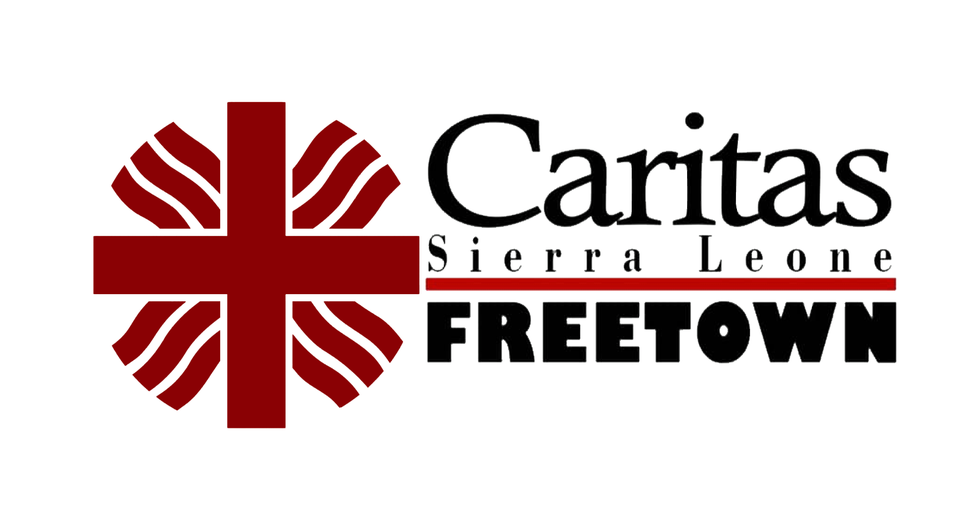Caritas Freetown and Fundación Maga Launch Hospitality Training Center in Bureh Town.
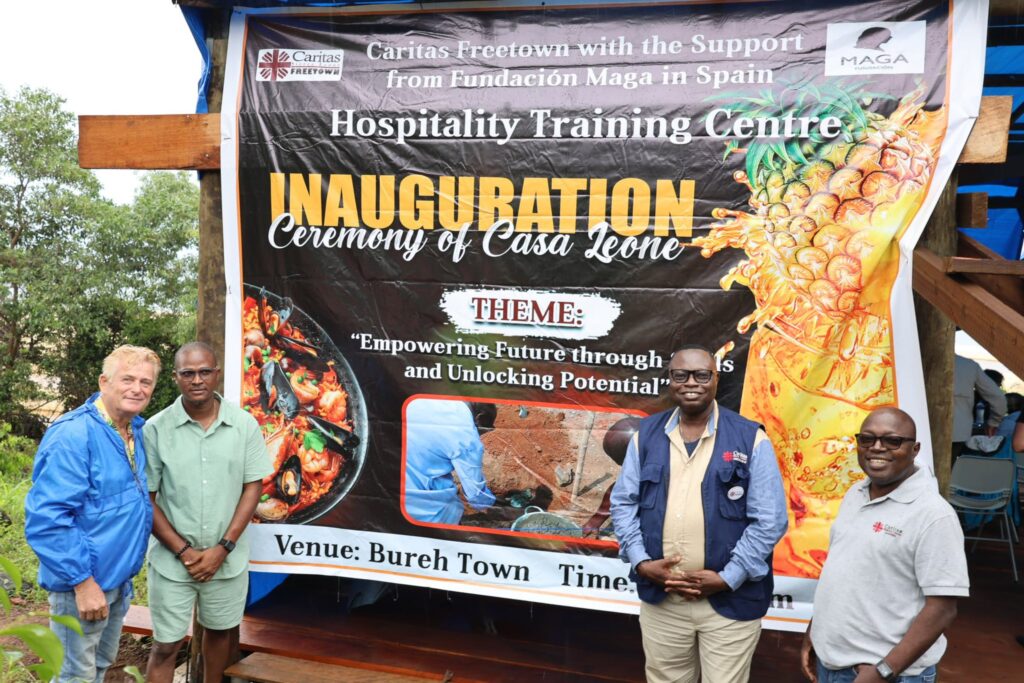
On Saturday, 28th June 2025, Caritas Freetown, with support from Fundación MAGA in Spain, officially launched a hospitality training center named CASA LEONE in Bureh Town, Western Area Urban. The launch ceremony brought together Spanish delegates, community stakeholders, residents, and staff members of Caritas Freetown. In his remarks, Ishmeal Alfred Charles, Programs Manager of Caritas Freetown, expressed gratitude to Fundación MAagA for their ongoing commitment to transforming lives in Sierra Leone. “This project will mainly provide training for vulnerable women and girls in hospitality and communication skills,” he said. He added that the initiative will not only create employment opportunities but also equip participants with essential skills for the hospitality industry. He further noted that the center will cater to both Sierra Leonean and Spanish cuisines. Charles extended thanks to the Spanish Chef Carlos, who provided hospitality training to one of the center’s operators in Spain, and appreciated those who hosted her during her training session in Spain. Rev. Father Peter Konteh, Executive Director of Caritas Freetown, also conveyed appreciation for the partnership with Fundación MAGA. “You have in a special way empowered our people, and that is going to bring transformation,” he said. He emphasized that this strong relationship could even justify the establishment of a Spanish embassy in Sierra Leone. “This is the beginning of many great things, and the relationship will continue to flourish,” he added, noting that the vision of Caritas aligns closely with that of Fundación MAGA. He concluded that the training will have a long-lasting impact, as beneficiaries will continue to pass on the knowledge to others. Speaking on behalf of Fundación MAGA, Javier highlighted the emotional significance behind the project. “This project would not have materialized if not for my late mother, in whose memory we created this charity, and the father who linked me to Sierra Leone,” he shared. Javier emphasized the project’s importance in complementing Sierra Leone’s development, especially in light of the country’s current living conditions. “With our expertise and the help of people who buy our wine and support our charity, we can make this project come true,” he stated. He thanked attendees for coming and urged them to give their time and energy to help the project succeed. Javier Gangutea Murua and his wife, Almudena Imhof Puente, officially unveiled the center, Casa Leone, under the theme: “Empowering Futures through Skills and Unlocking Potential.” The establishment of Casa Leone marks a significant step in empowering vulnerable women and girls in Sierra Leone through skills training and economic opportunity. With continued collaboration between Caritas Freetown and Fundación Maga, the center is expected to become a beacon of transformation, training future generations and fostering cross-cultural partnerships.
Business Development & Village Savings and Loan Association Training.
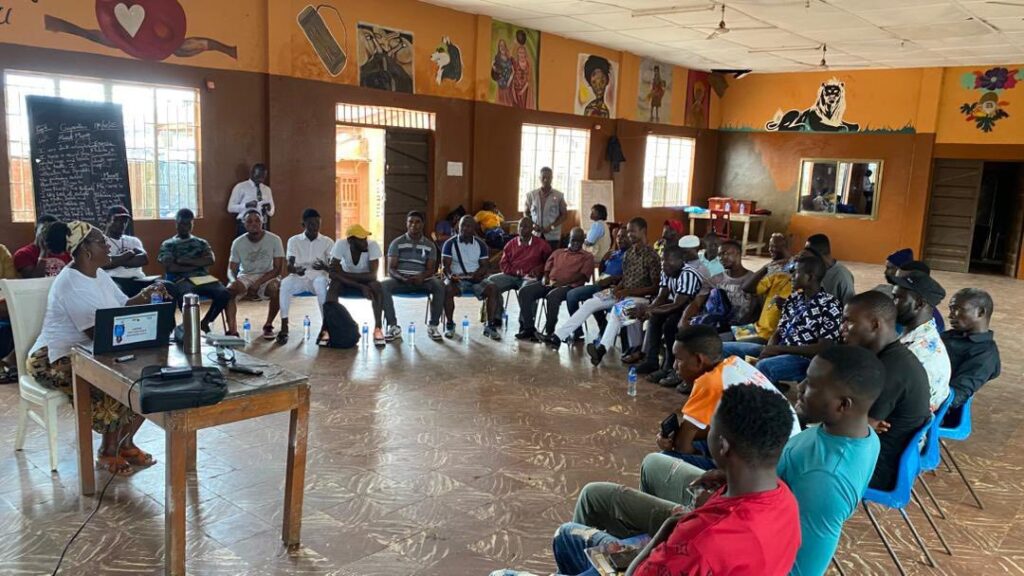
In an effort to conserve the environment while providing good, environmentally friendly livelihood activities, Caritas Freetown provide training for 30 men from the Kolleh Town and Cockle Bay communities who are transitioning from environmentally harmful livelihood activities to start up small-scale businesses. A comprehensive training on small-scale business management and Village Savings and Loan Associations (VSLA) establishment and management was done for the 30 men from the Kolleh Town and Cockle Bay communities. Training Objectives and Content The training was designed to equip participants with the essential skills needed to start and manage successful small-scale businesses. The facilitated topics include: * Business Development Skills: This section covers fundamental concepts of entrepreneurship, including how to identify viable business opportunities, create a business plan, and understand market dynamics. * Profit Maximization: Participants learnt practical strategies for managing finances, minimizing costs, and pricing goods or services to ensure profitability. * Navigating Loss and Risk: A crucial part of the training was teaching beneficiaries how to prepare for and manage business losses, and how to take calculated risks to foster business growth. This includes developing a resilient mindset and an understanding of contingency planning. * The Role of Village Savings and Loan Associations (VSLA): This component of the training was essential for financial empowerment. Participants learnt how to self-manage the establishment of VSLA groups, typically composed of 15 to 25 members, pool their savings, which then become a source of small, affordable loans for members to invest in their businesses or handle emergencies. This model enhances financial inclusion and promotes community economic development by: * Fostering a Culture of Saving, Providing Access to Credit, and Building Community Cohesion. The VSLA framework operates on mutual trust and collaboration. By combining business development skills with the practical, community-driven financial support of a VSLA, this training program empowers these men to create sustainable livelihoods, reduce their reliance on environmentally damaging activities, and contribute positively to the economic well-being of their communities. The small-scale business start-up grant was distributed to the 30 male participants at the end of the training.
Caritas Freetown JPC, with Support from Trócaire, Provides MPCA to 80 Vulnerable Households for Disaster Preparedness and Response.

On Monday, 1st September 2025, Caritas Freetown’s Justice and Peace Commission, through the Resilience Building and Disaster Mitigation for Vulnerable Communities in Western Area Urban and Rural Project funded by Trócaire, provided Multi-Purpose Cash Assistance (MPCA) to 80 vulnerable households across six communities: Kroo Bay, Culvert, Levuma Beach, Wellington, Moyiba, and New England. Each household received Le 3,460 to strengthen their preparedness against future flooding. This pilot initiative specifically targets flood-prone areas in the Western Urban and Rural districts, serving as a preventive measure. The cash support is intended to enable beneficiaries to repair or reinforce damaged homes, or, where necessary, relocate to safer ground, actions that can significantly reduce risks when flooding occurs. Speaking on behalf of Caritas Freetown, Project Manager Sheriff L. Bah explained that the assistance was grounded in a thorough needs assessment. “The beneficiaries were registered, and those most at risk were selected through a vulnerability-based focus group discussion held with community stakeholders and household heads,” he noted. He further emphasized that a post-distribution monitoring survey will soon be conducted to assess how the cash was used and to gather feedback on beneficiaries’ satisfaction with the support provided. One recipient, Kelvin Andrew Kebbie, a resident of Levuma Beach living with a disability, shared his experience. “I lost all my belongings, and part of my house was washed away by the floodwaters. It was very difficult for my family; we even had to sleep in a church because we had nowhere else to stay,” he recalled. Expressing gratitude, he added, “I am very happy to receive this support. I will use the money to repair my home. I thank Trócaire and Caritas Freetown JPC for their intervention and promise to use it for its intended purpose.” This intervention marks an important step in strengthening resilience among vulnerable households in disaster-prone areas. It underscores Caritas Freetown and Trócaire’s ongoing commitment to helping communities withstand the devastating impact of recurrent floods and fires in Sierra Leone.
Caritas Freetown Strengthens Commitment to Safeguarding the Vulnerable.
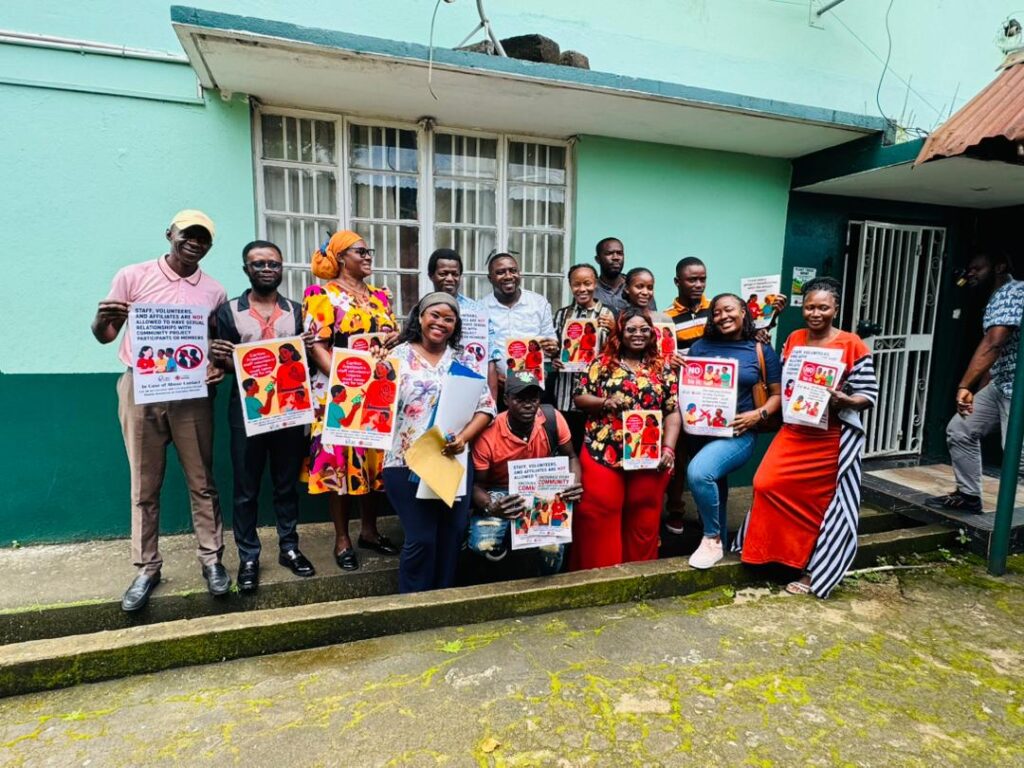
On Wednesday, 17th September 2025, Caritas Freetown organized a session on safeguarding policy. The training, held at the organization’s Field Office on Savage Street, brought together board members, project staff, and volunteers. Mrs. Grace Jones, the Safeguarding Focal Person of Caritas Freetown, explained that safeguarding goes beyond written policies. “It is a way of life that requires compassion, vigilance, and responsibility,” she said. Mrs. Jones noted that women and children are often the most at risk, facing harm, abuse, and exploitative situations that can silence them. “It is our duty to make sure they are protected, respected, and given dignity,” she added. She further emphasized that safeguarding is the collective responsibility of Caritas Freetown and its partners, project participants and affiliates to ensure people remain safe from abuse and risk of harm when receiving humanitarian assistance. The session highlighted several key lessons. Participants were reminded that protection is an aspect of safeguarding. Safeguarding the dignity and safety of women, children, and other vulnerable groups. Accountability was also underscored, with the message that safeguarding is not the duty of one department but a shared responsibility for all, from board members to volunteers. It was also made clear that abuse in any form, including exploitation, harassment, or neglect, has no place within the organization or society. To deepen understanding, participants engaged in group work, discussions, and presentations on safeguarding practices. The Session ended with a strong sense of unity and renewed determination. Participants left not just with notes but with a deeper commitment to ensuring that safeguarding remains central to the mission of Caritas Freetown.
Caritas Freetown and other development partners Observe International Day of Peace 2025.
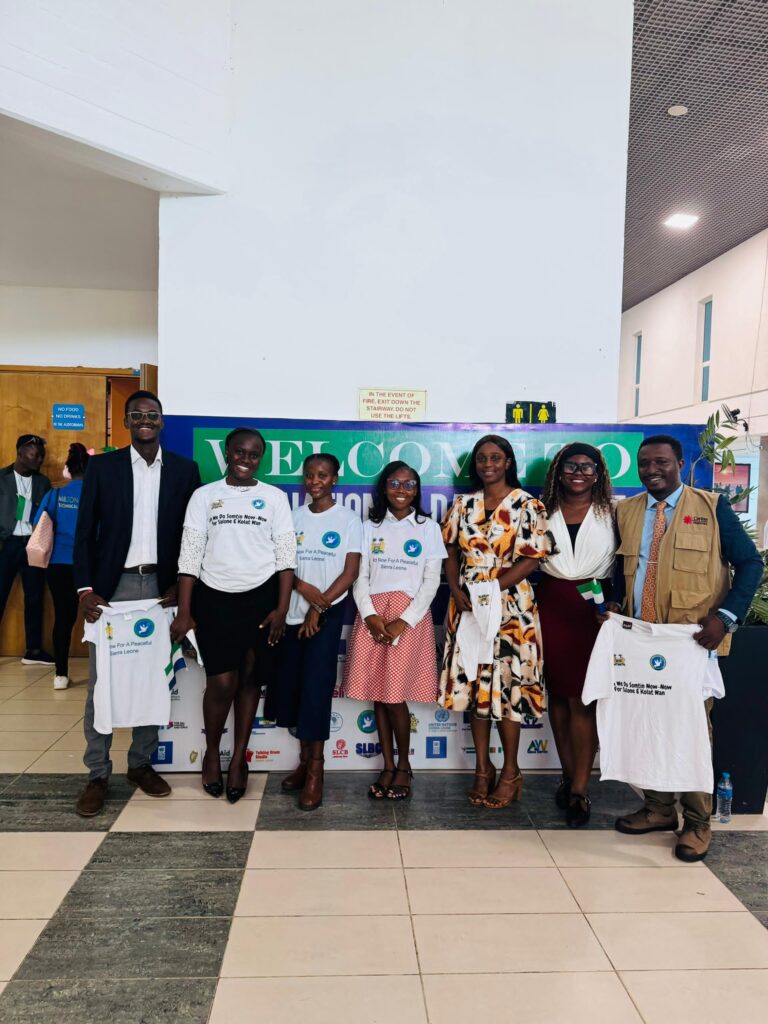
On Monday, 22nd September 2025, Sierra Leone joined the world in celebrating the International Day of Peace. The Independent Commission for Peace and National Cohesion (ICPNC) marked the occasion with a National Peace Symposium held at the Bintumani International Conference Centre in Freetown. The event brought together stakeholders from various backgrounds under the theme, “Act Now for a Peaceful Sierra Leone.” The symposium was designed to provide a platform for dialogue on how to strengthen unity and cohesion in the country. Leaders from government, religious institutions, academia, civil society, and youth organizations participated, reflecting the importance of inclusivity in peacebuilding. A panel discussion formed the centerpiece of the event, with distinguished speakers including Most Rev. Edward Tamba Charles, Archbishop of Freetown and President of the Inter-Religious Council of Sierra Leone; representatives from the Department of Peace and Conflict Studies at Fourah Bay College (FBC); the Ministry of Youth Affairs; the Women’s Forum; and the Children’s Forum Network. The discussion was moderated by James Fortune Esq. and created space for perspectives across generations and sectors. Archbishop Tamba Charles, in his contribution, emphasized the critical role of faith-based leaders in conflict mediation and the promotion of tolerance. Drawing on examples of the Inter-Religious Council’s interventions in times of national tension, he highlighted the importance of dialogue, healing, and reconciliation. He further reminded participants that peace begins with individual responsibility, stressing that religious leaders must continue to use their influence to guide communities toward unity, forgiveness, and mutual respect. According to him, peace cannot be defined solely as the absence of conflict but rather as the presence of justice, fairness, and inclusivity. The symposium also underscored the shared responsibility of different sectors in building and sustaining peace. Participants stressed the need for joint efforts among government, civil society, religious institutions, women, youth, and children to create a cohesive society. As discussions concluded, a collective call was made for immediate action to address critical challenges such as youth unemployment, political polarization, gender inequality, social injustice, and community divisions. The commemoration of the International Day of Peace 2025 was not merely a ceremonial event but a timely reminder of the urgent need for collective action. It reaffirmed that peace is everyone’s responsibility and must be nurtured through justice, inclusivity, and unity. By bringing together diverse voices under one roof, the symposium highlighted that Sierra Leone’s future depends on the willingness of all its citizens to act now for a peaceful and prosperous nation.
